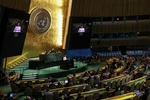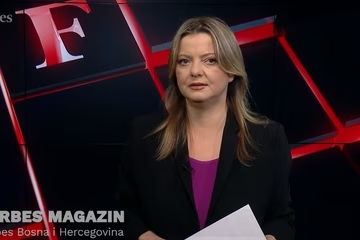Komsic: Israel's statement on BiH election reform is contradictory

Zeljko Komsic, one of the members of Bosnia’s tripartite Presidency, said that the positions expressed by the Embassy of Israel regarding the amendments to the Election Law of Bosnia and Herzegovina contain “several visible contradictions” and that further clarification is necessary.
Oglas
Komsic’s comment comes after Israel’s Embassy issued a statement in which it touched upon the issue of electoral reform in Bosnia and Herzegovina and welcomed the proposal of changes to the election law backed by Bosnian Croat parties.
The Embassy said that the State of Israel firmly believes that the 1995 Dayton Peace Agreement established “a sustainable system of power sharing between the constituent peoples and their political representatives” and that this must be respected and taken into account when considering solutions for the electoral law, “which must simultaneously ensure two key principles – equality and non-discrimination.”
One of the ways to maintain these key principles, it added, is through legitimate representation.
“In this regard, the Sejdic-Finci case (the ECHR's case treating the rights of minorities in the election process), as well as other judgments of the European Court of Human Rights, have yet to be implemented. Insufficient implementation remains a burden for BiH. In this sense, the readiness and proposals of the Croat side on changes in the electoral law are welcome,” it said.
Komsic said that Israel expressed support for the equality of all citizens in Bosnia and Herzegovina, which is a universal principle in all democratically governed countries.
However, he noted that, in the same statement, support was also expressed for "legitimate representation" as “an expression of the consociational political model, abandoned long ago in the world because it is based on systematic discrimination.”
Komsic argued that “the proponents of the consociation model in Bosnia and Herzegovina are those political actors whose policies are based on the denial of genocide, the glorification of war crimes and criminals, and on the realization of the goals of adjudicated joint criminal enterprises, which I firmly believe is not the official policy of Israel," Komsic stated.
He called on Israel to clarify the ambiguities that may cause different interpretations of the statement and to “clearly state whether the attitude is directed towards the support of the equality of all citizens, including our Jewish fellow citizens in Bosnia and Herzegovina, as a universal international principle, or whether, nevertheless, support for additional ethnic divisions, strengthening of systemic discrimination and inequality of voice is being expressed.”
“Our aspirations for membership in the NATO alliance and the European Union lead us towards universal principles, while the policies of 'consociations' and ethnic divisions distance us from these supranational organizations. That is why the clarification of Israel's positions is very important,” Komsic’s statement said.
Kakvo je tvoje mišljenje o ovome?
Učestvuj u diskusiji ili pročitaj komentare
Oglas
Kakvo je tvoje mišljenje o ovome?
Učestvuj u diskusiji ili pročitaj komentare
Oglas





 Srbija
Srbija
 Hrvatska
Hrvatska
 Slovenija
Slovenija


























































